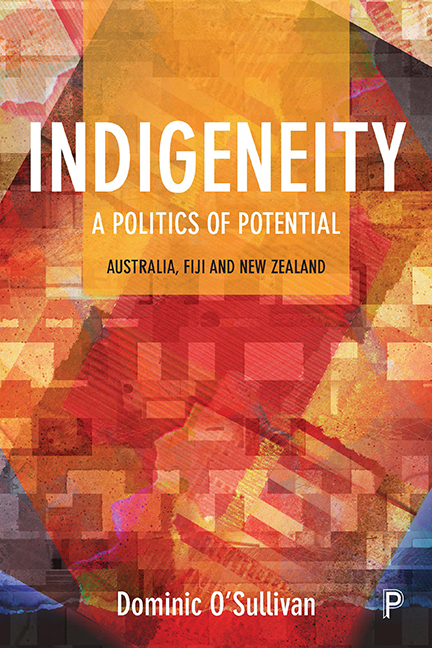Book contents
- Frontmatter
- Dedication
- Contents
- Acknowledgements
- Introduction
- one Reconciliation
- two The politics of indigeneity
- three Liberal democracy and differentiated citizenship
- four Liberal democratic inclusion
- five Indigeneity and contemporary globalisation
- six Economic development as differentiated citizenship: Australia
- seven Economic development as differentiated citizenship: New Zealand
- eight Economic development as differentiated citizenship: Fiji
- Conclusion
- References
- Index
five - Indigeneity and contemporary globalisation
Published online by Cambridge University Press: 05 April 2022
- Frontmatter
- Dedication
- Contents
- Acknowledgements
- Introduction
- one Reconciliation
- two The politics of indigeneity
- three Liberal democracy and differentiated citizenship
- four Liberal democratic inclusion
- five Indigeneity and contemporary globalisation
- six Economic development as differentiated citizenship: Australia
- seven Economic development as differentiated citizenship: New Zealand
- eight Economic development as differentiated citizenship: Fiji
- Conclusion
- References
- Index
Summary
Introduction
Globalisation is a political paradox, an ‘ambiguous’ concern (MacDonald and Muldoon, 2006, p. 209), evoking sharply conflicting assessments of opportunity on the one hand, and neocolonial injustice on the other. Indigenous self-determination, through differentiated citizenship, is as much the product of global developments in extra-state political and economic relationships as it is the product of a group's place within the nation state. These developments support indigenous peoples’ efforts to set aside colonial legacy. Yet it also remains that indigenous peoples’ initial experiences of globalisation are with imperial expansion and the colonisation of their territories. Tendencies in contemporary scholarly discourse to position globalisation as continuing to oppress and marginalise are well argued (Friedman, 1999; Fenelon and Hall, 2008; Kelsey, 2005a; 2005b; Stewart-Harawira, 2005) but, as this book's remaining chapters show, there are alternative possibilities that indigenous peoples pursue to demonstrate that global capitalism need not always and necessarily compromise indigenous goals.
Indigenous economic agency is also enhanced where the globalisation of political and jurisprudential thought on the rights of indigeneity counters state assertions of absolute sovereignty often to reinforce the economic opportunities that globalisation can create to reduce indigenous dependence on the state. When states try to assert authority over the wishes of indigenous communities, one sees that it is not globalisation per se that affronts the rights of indigenous peoples, but its regulation by prejudice, historical legacy and state claims to overriding sovereignty. In contrast, globalisation is increasingly creating new space for worldwide indigenous political activism and cooperation. Indigeneity's growing influence within the United Nations has heightened international scrutiny of colonial and assimilationist conceptions of citizenship. Developments at international law provide a principled framework for thinking about both the possibilities and limits to indigenous rights in postcolonial societies. In globalisation's current phase of capital expansion and the universalisation of human rights, opportunities for indigenous peoples to reclaim personal agency are increasing and the barriers of prejudice and history that do remain are largely due to domestic considerations. Globalisation per se does not harm indigenous peoples; rather it is the regulation of its conduct and broader domestic public policy that exclude indigenous peoples from economic development that better explains their economic and political vulnerability.
- Type
- Chapter
- Information
- Indigeneity: A Politics of PotentialAustralia, Fiji and New Zealand, pp. 91 - 108Publisher: Bristol University PressPrint publication year: 2017



